Recently updated on July 3rd, 2025
Training platforms that fall into the category of online training software help training providers, in-house teams, and corporate training teams create, host, and schedule all their commercial and in-house training programs.
The tricky part for buyers is understanding which types of training software fall under the category of online training software, the features they should look for, and some of the top solutions to consider.
In this guide, we aim to provide a clearer understanding of these key points by defining online training software, examining the essential features to consider, and reviewing nine potential solutions for you to explore.
What is online training software?
At Arlo we define online training software can be defined as any digital platform that facilitates the creation, management, and delivery of training programs and courses.
A platform that fits this description will typically include features for course development, learner registration, progress tracking, and assessment, and in some cases (if the platform is set up for users to monetize their courses) ecommerce functionality.
The nuance lies in the type of training that these platforms cater to.
For example, training platforms like Arlo, which fall into the category of training management software, have traditionally built to support the delivery of instructor-led training—both in-person and virtual.
The other main type of training software that can fall under the online training umbrella are learning management systems. LMSs are more suitable for creating, hosting and delivering eLearning content.
The gap is narrowing though, platforms like Arlo now have eLearning authoring features that allow users to create and host elearning content, while leading LMSs are developing (or have developed) features to help with the delivery of instructor led training.
Why is this? The reason is that there’s no one size fits all training delivery methods that suits all training scenarios. Some topics are better taught through elearning, some in a live setting either physical and virtual, and some in a blended format.
Take this example from Arlo customer Tammy Banks Co-Founder of Transform Your Training, a UK based Learning and Development Consultancy:
“We recently worked with a physiotherapy company that has offices all over the country. They have managers for all their offices, and they also have clinical leads. And they wanted to enroll all of them in our leadership training program.
So, to effectively deliver the program we decided to completely tailor the structure of the course to their needs. Everyone comes together face to face in London for a full day, and then after they have fortnightly 90 minute live online sessions.
Alongside the live sessions delegates have their own eLearning modules to work through, and the elearning modules directly feed into what they’re going to learn in the live sessions. The facilitator has access to a portal where they can see how each delegate is progressing through the self-paced modules.
Delegates are also part of an online community where they can discuss what they’re learning with one another and collaborate. We then have another face to face session at the end of the course to celebrate everyone completing the course”.
What is online training software used for?
Online training is a broad term for any training delivered online. For brevity, we’ll focus on the main types of training that training management software and learning management software, the two primary categories of ‘online training software’, are used for
Use cases of training management software:
Managing instructor-led training programs: the management of ILT programs is where a TMS excels, whether delivered in person or virtually. This ‘management’ includes scheduling instructors, booking physical venues or virtual meeting links, processing bookings and registrations, automating communications, sending certificates and assessments and much more.
The common industries that run regular ILT are:
Health & Safety Training Providers – This includes training for certifications like OSHA, first aid, fire safety, and hazardous materials handling.
Professional Associations – These offer leadership development, project management (like PMP), legal training, and industry-specific certifications.
Construction & Trades Organizations – Training in skilled trades such as plumbing, electrical work, welding, and heavy machinery operation.
Business and Leadership Training Companies – These focus on corporate leadership, team-building, communication skills, and management development.
Healthcare & Medical Training – Training for healthcare professionals, including nurses, clinical staff, medical device operation, CPR, and compliance.
Others include: Finance & Accounting Training, Manufacturing & Industrial Training, Hospitality & Service Industry Training, Education & Training Providers, Retail & Sales Training.
Use cases of learning management software:
The applications of learning management software focus much more on internal training of employees, such as:
Employee Onboarding and Training: Organizations of all sizes use a learning management system to deliver introductory training to new hires, as well as continuous professional development and upskilling programs for existing staff.
Compliance training: LMS are used to deliver and track mandatory compliance training. They contain automatic tracking features which lets staff know when a course is due, when certifications expire, and when updates to policies or regulations require their attention.
Sales Enablement and Partner Training: Many organizations use an LMS to upskill their sales team and partners with product knowledge, sales skills training, and other relevant materials they need
Customer Training: Organizations use an LMS to train and educate their customers on their products, new features, best practices and more. Doing so helps reduce support costs, improves product adoption, and customer satisfaction.
What features should you look out for?
If you run instructor-led training look out for:
Course development capabilities
Different types of online training software can assist in creating a variety of courses. For example, with a training management platform like Arlo, you can bulk upload your courses and publish them immediately to your website.
You can also utilize course templates to quickly create courses suitable for different delivery methods, such as face-to-face, live online, elearning or blended formats.
Course scheduling and registration
The online training platform you use should include features for scheduling and registering for courses. These features can help you upload courses to your website, set the date and time for the course, choose the delivery method, and manage all logistical aspects, such as email communications and trainer or instructor bookings.
Registration features typically include form templates tailored for different types of courses, such as paid or free, public or private.
Many platforms also allow you to create custom registration forms, enabling you to add or swap out fields to capture the information you need based on the course you’re offering.
Some platforms offer templates for more specific use cases, such as conferences or camps. The most important thing to consider is the types of classes, or courses you are running. For example, if you only conduct a few classes each year, a simple or free registration option that allows you to create basic forms may be sufficient.
However, if you run regular courses and handle a significant number of registrations—such as a minimum of 500 per year—you’ll need a more robust solution, like a dedicated course registration platform with a more robust feature set.
Learner and instructor management
Many training platforms have features that help you manage instructors, such as assigning an instructor to a course, managing calendars to avoid conflicts, assigning resources to instructors, and setting up automated communications, like sending emails when they receive a new course sign-up.
Learner management tools include features such as attendance tracking and reporting, course completion statistics, and customer portal functionalities that allow learners to log in and manage their own registrations and details.
Assessment and feedback
Online training software includes tools for quizzes, tests, and evaluations, helping assess learner understanding and providing feedback for improvement.
Leading online training platforms will also usually integrate with surveying platforms such as SurveyMonkey, so you can set up all your pre and post course surveys easily and set up workflows for them to send automatically when you need them to.
Compliance and certification management:
If you run ILT make sure the platform you choose has the capabilities to streamline the process of managing certifications and licenses. The platform should automate the workflow of approving and renewing certifications, licenses, and memberships, based on course or eLearning activity registrations.
You should be able to create, format, and upload certificate templates, giving you complete control over the certificate creation and management process.
If you’re looking for a platform to primarily manage internal training look out for:
Best online training software ranked for 2025
1. Arlo – the best online training software for instructor-led training
Arlo is a comprehensive training management platform designed specifically for instructor-led training providers and organizations that want to automate their training management processes, set up and schedule courses in just a few clicks, and ultimately spend less time on administration and more time on training.
Here’s a guide to Arlo’s key features:
Simple course creation and scheduling
Inside Arlo you can get started by creating a new course from scratch, or, if you want to speed up the process, you can use a course template from an extensive library within Arlo.
Specific templates are available for face-to-face, live-online, blended and eLearning formats, so you can deliver training in the format most suited to your learners.
When you create a new course using a template it will be automatically generated, pre-filled with key information that you can edit and save.
You can then re-use the template as many times you like, making it easy to schedule repeat courses on multiple dates and locations. Once you’ve created the course, you can set up all the logistical tasks relating to the course, including choosing the physical location (venue or room) or the virtual location (such as a Zoom room), assigning an instructor or presenter, and more.

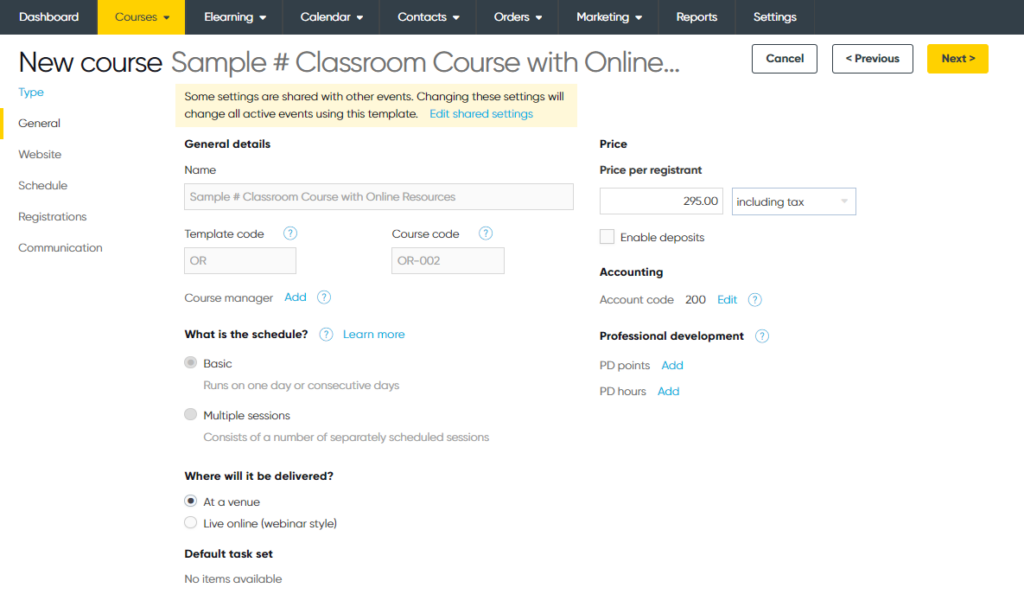
Once you’ve created the course, you can set up all the logistical tasks relating to the course, including choosing the physical location (venue or room) or the virtual location (such as a Zoom room), assigning an instructor or presenter, and more.
When the logistics are handled, you’ll come to a publishing page where you can input the course description, add a summary, and set the amount of time you want your course to be advertised for.
Setting up your registration forms
Within Arlo you can use preset registration form templates for both public and private courses, that are suitable for paid and free courses. Paid course registration forms include a complete payment and invoice process, where registrants receive a payment confirmation (or invoice) email immediately after completing the form, as well as an email with full course details.
For free classes, you can use a simple one-page form, which sends a confirmation email with all course details to the participant upon registration.
Course registrants can register for multiple classes within the same form, add multiple participants, and, if configured, use a voucher code, choose their payment method, and more—all within the same form. Your admin can also set rules for screening, set wait lists, and registration limits.
Payment options within the registration forms are flexible, you can take payments via Stripe, PayPal, Windcave and more. You can offer flexible payment options such as credit card, invoice or bank transfer, and Arlo integrates with leasing accounting platforms like Xero or Quickbooks for easy accounting.
Also, within Arlo you can manage all aspects of transfers, refunds, and cancellations. Built-in tools allow you to easily cancel or transfer registrations and automatically notify your customers of any changes that you make, and enable registrants to self-serve cancellations or transfers.
Finally, when you’ve integrated Arlo with your website you can create a branded customer portal, hosted as a page on your website, that gives registrants the ability to sign into their personal account, where they can register for classes, view upcoming and past courses you’ve ran, manage their profile and more.
Automate all your course communications
After setting up your registration forms you can set up and automate all your course communications. This includes setting up instructor confirmation emails, venue booking confirmation emails, registration confirmation emails, reminders for instructors and other relevant stakeholders and more.
In addition to this, you can set up course registrant reports, and attendance reports to send to the presenter after the class has been delivered.
You can also set up follow up emails to attendees and non-attendees containing any materials you want to send post course, and set up automations to send certificates to learners who’ve completed the course.
In-depth reporting
The training software you use should also have reporting features so you can monitor and report on the success of your training programs. Arlo makes this easy by providing access to a range of reports that show exactly how individual courses are performing:
Course registration reports
Registration reports allow you to track metrics such as registration numbers per course, number of registrations by organization, and much more. They are very useful for internal reporting purposes.
Course order reports
Order reports are for understanding the financial performance of your training programs. You can create reports to see the revenue your training business has generated over a specific period, drill down to view revenue generated by each individual course, compare courses to identify financial performance, and run queries to identify outstanding balances and billing contacts for follow-up.
Set favorites and schedule reports
To save time, you can mark frequently used reports as favorites for easy access. You can also schedule reports to run automatically and have the results sent via email to key stakeholders upon generation.
For example, if you’re an administrator and need to report on the profitability of a particular class or set of courses you can set up a report to automatically generate upon the completion of the course, and set up automations for this report to send to your direct report.
Combine reports for business intelligence
Combining data from multiple reports allows you to gain comprehensive insights into different areas of your class performance within a single report.
For example, you might merge performance and expense reports to determine course profitability or analyze occupancy rates to ensure you’re scheduling courses at times that drive the most registrations.
Course feedback collection
Arlo integrates with email marketing and customer surveying platforms like SurveyMonkey to make it easy for you to set up and send both pre-and post-course surveys.
Simply create the survey, set up the course, and Arlo (or SurveyMonkey) will send the survey for you. Arlo’s SurveyMonkey integration also allows you to automatically distribute surveys either when the course starts, when the course finishes, or when the registrants are marked as having attended the course.
Integrate Arlo with your own website or enjoy an out of the box website designed for training
As part of centralizing your training operations into one platform Arlo integrates with your existing training website (should you want it to).
This means that when you publish a new course on Arlo it will automatically be published to your website, so you don’t have to manually upload your course to multiple platforms.
You also get access to our extensive library of pre-built web pages and widgets to integrate into your existing site, these templates include:
- Course pages detailing details about your upcoming courses such as dates, course duration, and a descriptive overview of what the course is about
- Trainer/presenter detail pages profiling key details about the person presenting your courses
- Venue details pages showing users exactly where your course is going to take place.
- A course feature widget that you can use to promote a chosen course on your website’s homepage.
View some selected examples of the best training websites built with Arlo’s templates, and a more extensive gallery here.
Integrate Arlo with your wider tech stack
Any new tech platform you select should ideally integrate with the other parts of your tech stack, and Arlo does just that.
You can integrate Arlo with everything from accounting platforms such as Xero, Sage and Quickbooks, leading learning management systems (LMS) such as Moodle, Coassemble LMS and LearnDash, communication platforms such as Zoom, Gmail, Outlook and Slack, through to leading CRM’s such as Salesforce and Microsoft Dynamics 365.
These integrations mean you can connect Arlo with your key apps, and discover new opportunities to improve your training processes and workflows.
What types of training can you use Arlo for:
- Instructor-led training
- Blended training
- Self-paced elearning
- Compliance training
- Customer training
- Employee training (if you require registrations)
- Onboarding training
- Professional development training.
If Arlo sounds like the training solution you need for your business, you can get started with a 14-day free trial below 👇
Try Arlo for free.
2. Skyprep – suitable for employee training
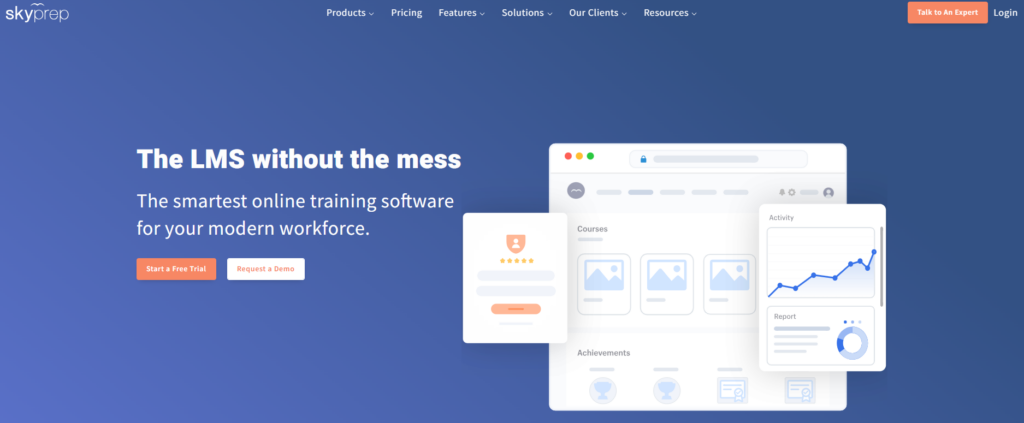
Skyprep is an LMS that has features facilitating employee onboarding, development, customer and compliance training and more. You can improve your training programs by offering tailored learning experiences through distinct portals for various brands or clients, all managed under a single account. Each learning environment can be customized with unique branding and content, allowing you to create a personalized experience for different segments of learners.
You can easily share courses and materials across these platforms, ensuring consistent access to high-quality content. You also have the flexibility to modify the appearance of each portal by adjusting colors, logos, and notifications, making it simple to meet the specific needs of diverse audiences.
The platform also has features for creating engaging learning materials by incorporating various media types and assessment methods within a streamlined program. A range of tools is available to help you build comprehensive courses, including assessments and checklists that enhance knowledge retention. Regular knowledge checks throughout the training help reinforce skills and demonstrate real-world applications.
You can also establish user workflows with course checklists to monitor progress and ensure successful completion. Additionally, there’s the option to upload SCORM files or create content directly within the platform, allowing for diverse and engaging learning experiences.
Pricing
Skyprep has three plans available: Lite, Premium and Enterprise – pricing for each plan is available upon request.
3. TalentLMS – good choice for larger corporations

TalentLMS is a cloud-based corporate LMS aimed at helping teams grow. Key features include comprehensive course management with support for eLearning standards like SCORM and xAPI, along with AI-driven content generation to create diverse training materials. Users can easily integrate multimedia, design assessments with various question formats, and establish structured learning paths to guide learner progression.
Communication tools, such as messaging and discussion forums, enhance engagement, while reporting and analytics provide valuable insights into learner activity. Security is a priority, with strong password enforcement and GDPR compliance features to protect user data. The platform also supports seamless integration with popular applications like Salesforce and BambooHR, allowing for streamlined operations.
Pricing
Talent LMS have four plans available (all prices in USD):
- Core priced $89/month
- Grow priced at $139/month
- Pro priced at $179/month
- Enterprise – pricing available upon request.
4. Moodle – best low cost, and most customizable LMS

Moodle is an open-source learning management system (LMS) designed to facilitate online education and training. One of its key features is a highly customizable course structure, allowing educators to create engaging and interactive learning experiences.
Moodle supports various content types, including videos, quizzes, and assignments, which can be organized into modules for easy navigation.
User management is another important aspect of Moodle, enabling administrators to create user accounts, assign roles, and monitor participation and progress.
Moodle also includes assessment capabilities, allowing instructors to design and administer quizzes and assignments that can be automatically graded.
Pricing
Moodle is available for free, depending on the use-case. But they have five standard plans available (priced annually in USD):
- Starter plan – $130
- Mini plan – $220
- Small plan – $400
- Medium plan – $920
- Standard plan – $1750
5. 360Learning – LMS designed for collaborative and continous learning

360Learning is an LMS designed as a platform for collaborative learning. Collaborative learning is a method where employees share knowledge and teach each other, fostering a people-centric approach to skill development through teamwork and collective expertise.
In terms of features, 360Learning offers tools specifically designed to help companies onboard new employees, upskill their teams, get accustomed to new software, and ensure compliance. Standout features include AI course authoring tools, automated syncing of learner analytics to HR systems, and integration with platforms like Salesforce, MS Teams, and Zoom for e-commerce course monetization.
Pricing
360Learning have two plans available:
- Team plan – $8 per registered user per month
- Business plan – Pricing available upon request.
6. eloomi – another good option for onboarding training and ongoing employee deverlopment
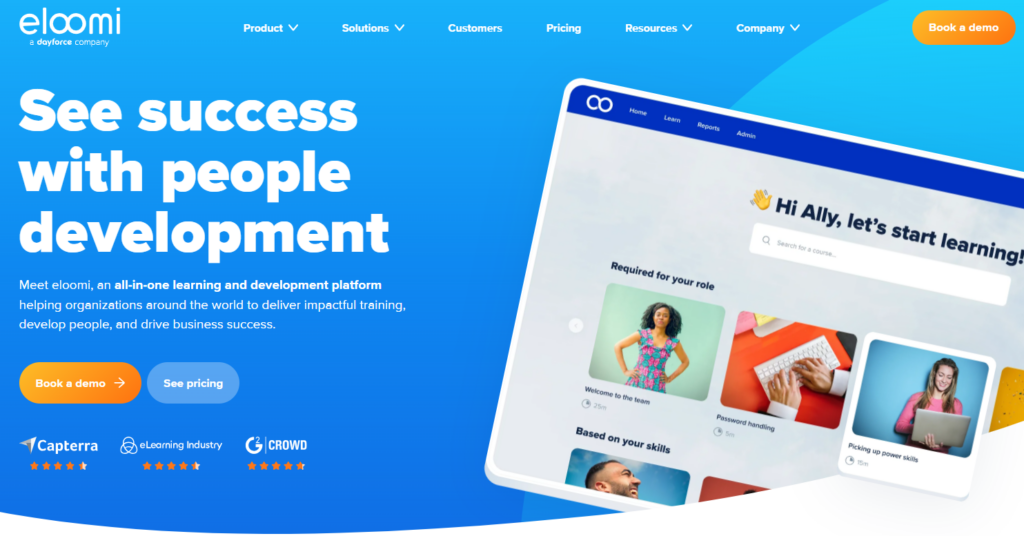
eLoomi is a solution designed to help companies manage all of their employee training and development. It simplifies employee engagement by integrating various tools for eLearning content, skills management, communication, and performance tracking.
The platform supports effective employee communication through features like activity feeds and social learning communities. It also facilitates people development by automating HR tasks, enabling goal setting, and gathering feedback during performance discussions. Additionally, mobile access allows employees to engage with training materials from any device.
This system addresses a range of learning challenges, including compliance training, onboarding, and skills development, aiming to make employee training easier and more effective.
Pricing
eloomi have three plans available:
- Play plan – pricing available upon request
Plus plan – pricing available upon request
eLoomi One plan – pricing available upon request
7. Trainual – good platform for onboarding training
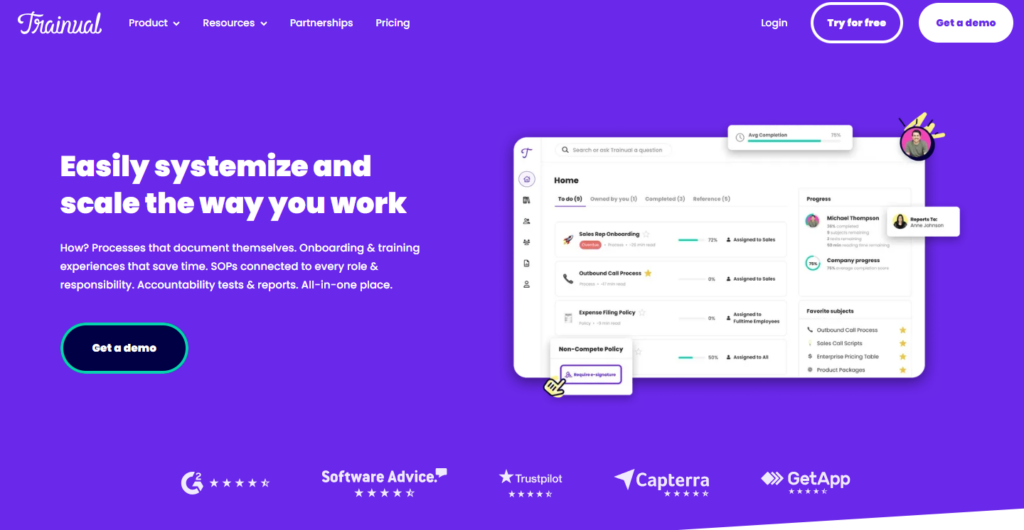
Trainual is an employee training platform helping new employees get started quickly when they begin a role. One standout feature is role-based training, which automatically assigns training based on each employee’s job, department, or location. This ensures everyone has the right resources without extra manual effort. Additionally, training materials are easily accessible and searchable, allowing employees to find important information when they need it.
The platform offers customizable content, making it easy to create engaging training paths that fit individual needs. You can track progress and generate reports to see how employees are doing, which helps ensure accountability. Features like e-signatures and completion reports help keep track of training progress.
Pricing
Trainual have four plans have four plans available:
- Small plan – $299/month
Medium – $349/month
Growth – $499/month
Custom – available upon contacting the company.
8. Podia – solid option for course creators

Online training and course creation platforms, such as Podia, provide users with the tools to build and sell courses effectively. Creators can manage course content, marketing, and community engagement all in one place. Users can easily upload videos, create sales pages, and handle payments without needing extensive technical expertise.
Podia supports a variety of course formats, including standalone and cohort-based courses, and offers integrated video hosting, eliminating the need for additional storage solutions. Its built-in marketing features, such as customizable websites and email marketing tools, help users grow their audiences efficiently.
Flexible checkout options enable creators to sell individual courses or bundle them with other offerings, while features like upsells, course certificates, and waitlist management give creators flexibility in what they offer.
Pricing
Podia has three plans available (all prices in USD):
- Free plan
- Mover plan – $39/month
- Shaker plan – $89/month.
9. iSpring Learn – another good choice for large corporations
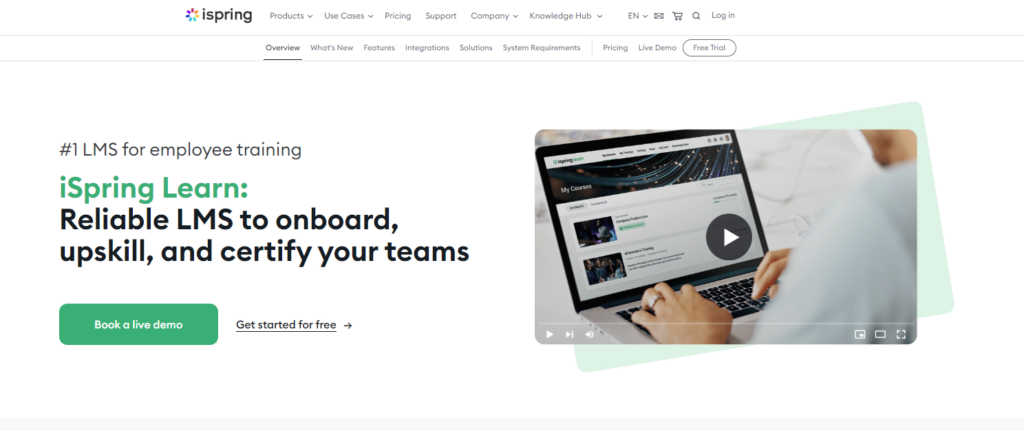
iSpring Learn is a flexible corporate LMS with a range of useful features. Users can upload various file types like presentations and videos without storage limits, and it supports SCORM for existing content. The platform allows the creation of interactive long reads with exercises and customizable designs.
User management is straightforward, enabling organizations to set up roles and groups for efficient training assignments. Administrators can quickly add users, filter assignments, and track progress with detailed reports. Learning paths can guide users through structured training, with notifications and assignments for added engagement.
iSpring Learn integrates with Zoom for live sessions and includes a calendar for managing sessions. Reporting tools provide insights into user activity and content effectiveness, while a 360-degree feedback system supports comprehensive evaluations. The platform can be customized to fit corporate branding and supports multiple languages.
Learners benefit from an intuitive portal that organizes courses and uses gamification to increase motivation. A mobile app allows for offline learning, and the platform can integrate with existing systems or be installed on-premise, making it adaptable for small and large businesses.
Pricing
iSpring Learn has two plans available: Start and Business pricing is dependent on the amount of users required.
Important final points to consider
1. Choose the Right Training Platform for Your Needs
Focus on a Training Management System (TMS) for Instructor-Led Training (ILT):
If you’re managing instructor-led training, prioritize a TMS that allows you to schedule courses, manage registrations, and streamline communication. Features like instructor booking and venue management will save you time.
Choose a Learning Management System (LMS) for Internal Employee Training
If your goal is to create and rollout employee training programs LMS is likely your best option. Prioritize features like course authoring tools, SCORM compliance, and progress tracking.
Opt for a Platform that Supports Both ILT and eLearning for Blended Learning Programs:
If your training combines ILT and eLearning, select a platform that offers both TMS and LMS capabilities. Consider platforms like Arlo, which support both instructor-led sessions and elearning creation and delivery.
Pick a Platform that Supports Multimedia to Enhance Training
Choose a training platform that lets you integrate videos, audio, interactive quizzes, and other multimedia elements. This will make your training more engaging and ensure more diverse learning experiences.
2. Look for a Platform That Helps You Deliver Training More Efficiently
Online training software TMS’s and LMSs alike can help streamline administrative tasks, including course creation, enrollment management, and grading.
Look for solutions with automated scheduling and enrollment features to improve learner experience and save time on administrative tasks.
Training management software and learning management can also automate processes like grading tests and course assignments.
Choose a platform that generates automated reports to simplify compliance tracking and performance monitoring.
LMS platforms with built-in reporting and analytics capabilities help track learner progress, improve training effectiveness, and can track compliance if that’s your use case
Training management software can also automate reporting for commercial and internal training purposes. For commercial purposes a TMS can help you monitor course registration rates, completion rates, how much revenue a course has brought in and more.
For internal training purposes a TMS can track training completion, certifications, and compliance.
3. Prioritize User Experience and Learner Engagement
Select a platform with an intuitive user interface that is easy to navigate. A TMS should be easy for a training admin to use, to help with this for example, Arlo has support documentation you can access at any time to learn how our platform works.
4. Consider the Wider Benefits the Platform Will Bring to Your Organization
When you’re making a decision on a training platform it’s important to think about the wider benefits it will bring to your organization.
Here’s a few you can expect:
Time saved on admin
If you provide training to clients a TMS will reduce the amount of time it takes for you or your team to create, deliver and sell your training.
Expect your manual training processes to reduce by as much as 80%.
Increased revenue
Similar to the above, if you deliver training to clients or sell it commercially, a TMS will help you bring in more registrations, and therefore increase your revenue.
- Read how Taye Training 4x’d their training business with Arlo
- Read how Arlo helped the International TEFL Academy increase course profits by 236% with a streamlined registration process.
Employee Development and Retention
Focussing on internal training, an LMS helps with employee development and therefore retention. Backed up by these stats:
- 94% of employees stay longer in companies that invest in their professional development
- 59% of employees say training improves their overall job performance
5. Scalability and Support
It’s important not just to think about your needs today, but also consider what they will look like in the future. You want a platform that can scale with your organization’s growth. For commercial training this looks like making sure the platform can support more admins as you grow.
For internal training you’ll need to make sure the platform can support the number of employees you’ll be looking to train. Additionally, look into the support options a provider offers and determine your needs.
Finally, consider what integration the platform offers, you’ll want to choose a platform that integrates with the other key platforms you use e.g. your CRM.
Conclusion
As you can see, the best online training software for your specific needs will depend on the type of training you’re conducting and the features you require.
This guide should have provided you with an overview of the key features to look for and some options to consider. The main takeaway is that if you’re running instructor-led training, whether in-person or virtually, a training management system like Arlo offers all the features you need to set up, schedule, and manage your instructor-led courses.
If you’re looking for a solution to create, host, and manage eLearning content, a learning management system might be what you need.
To get started with Arlo, you can book a demo with our friendly team, who can give you a personalized look at the platform. Alternatively, you can try it out for free by starting a free trial below.
Try Arlo for free.
FAQs
If you’re looking to scale, consider platforms that allow you to create and sell online training courses alongside your instructor-led offerings.
A good TMS will help manage registrations and scheduling for both, while an LMS is ideal for creating and hosting the digital content. The key is to find a platform that bridges both worlds if you want to offer blended options.
That depends on your training focus. If you’re primarily delivering pre-recorded modules and compliance training, an LMS is likely the better fit.
However, if you’re running regular live sessions, workshops, or blended programs, a TMS will offer the scheduling and registration tools you need. If you are doing both, consider a platform that offers both, or integrates both.
Online training software can streamline your program by automating tasks like enrollment, tracking, and reporting. It also allows you to deliver consistent training experiences across your organization. A TMS can help with live training, and an LMS with on-demand content.
Start by defining your core training needs and create a list of essential features. Then, compare platforms based on those criteria. Look out for platforms with free trials, so you can test them out before purchasing. This process will help you find the best employee training software for your needs.
For partner training, you’ll need a platform that offers robust user management and access control. Consider an LMS if the training is mostly self-paced.
If you are doing live training, you will need a TMS. You may also want to consider a platform that allows you to brand the training portal with your partners’ logos.